Dusty Springfield
I had the Sirius station tuned to the 60s channel when Dusty Springfield’s song, “I Only Want to Be With You” came on. “I don’t know what it is that makes me love you so,” she sings. “I only know I never want to let you go. ‘Cause you started something, oh, can’t you see? That ever since we met you’ve had a hold on me. It happens to be true, I only want to be with you.” I remembered during the song that Dusty Springfield was supposed to be bisexual; “Son of a Preacher Man” was another one of her big hits. When I got home I decided to google Dusty Springfield and see what became of her. Not only was Dusty Springfield not bisexual—she was a lesbian—she was in the midst of a torrid affair with a woman in Memphis when she recorded “Son of a Preacher Man.” Dusty Springfield was one of the most successful female British singers of the 1960s, with a half dozen singles in the top 20. “You Don’t Have to Say You Love Me,” (1966) was her biggest hit in the U.S. and the U.K.
“There is a sadness there in my voice. I was born with it. Sort of melancholy. Comes with being Irish-Scottish. Melancholy and mad at the same time.” – Dusty Springfield
“My sexuality has never been a problem to me but I think it has been for other people.” – Dusty Springfield
EARLY DAYS
Dusty Springfield was born Mary Catherine Isabel Bernadette O’Brien in London, England on April 16, 1939. Her mother was Irish and her father was Scots-Irish. She was a tomboy growing up, and given the name “Dusty” playing football (soccer) with the boys. She attended an all-girls school, St. Anne’s Convent School in Enfield, London. The nuns predicted that the shy girl was going to become a librarian. As a teen, Dusty had short auburn hair and glasses. She credited the school with her first “blues” performance during a school assembly. After she left at 16, Mary O’Brien recreated herself as “Dusty Springfield,” a glamorous blond with make-up, teased hair and mod outfits.
In the early years of her career Dusty remained a practicing Catholic. The tour bus stopped so she could go to confession or attend Mass. But as the Sixties progressed, the practice of her faith diminished, and she began her long struggle with alcohol, self-harm, and violence in her relationships. She was eventually diagnosed as suffering from bipolar disorder in addition to alcoholism. 
Growing up, Dusty knew she was attracted to girls. Her first crush was on one of the nuns. She told Sue Cameron, one of her lovers, that she would watch a girl who lived across the street get undressed in front of the window. Her discovery of her lesbianism led to internal conflicts with her Irish Catholic upbringing, which she never resolved. Most Catholic lesbians and gays could not reconcile their sexuality and faith in the 1960s, and it is still a struggle today. To be one, we had to hide the other. This lack of authenticity and wholeness affected every part of Dusty’s life. Her inability to talk about that part of herself and her relationships produced terrible conflict and pain. For many years she managed it by drinking, drug use, and transient affairs and relationships, and the ever-present cloud of guilt and shame.
CAREER SUCCESS
Dusty had her first woman lover in 1963. In early 1964, her career took off with her first hit single, “I Only Want to Be With You.” Her desire for other women was forbidden in Britain at that time, so like most lesbian and gay artists, she performed for the straight majority but with emotions that were directed to her female partners and pursuits. During her peak, Dusty Springfield ranked among the most successful female performers on both sides of the Atlantic. Her blonde, bouffant hairstyle, heavy eye makeup, evening gowns, and stylized hand gestures, made her an icon of the Swinging Sixties.
She was in the limelight throughout the 1960s with such hits as “I Only Want to Be With You” (1964); “I Just Don’t Know What to Do With Myself” (1964), “You Don’t Have to Say You Love Me” (1965), “All I See is You” (1966), “The Look of Love” (1967), “Breakfast in Bed” (1969) and Son of a Preacher Man (1969). At the same time, Dusty was terrified that her lesbian love life would come to light and her career would be ruined. She also worried about its impact on family, friends and fans. Dusty Springfield hid her lesbianism for years, and used her Catholic upbringing as an excuse: “You have to concentrate on marriage and I’m a Catholic and can’t get divorced,” she said. Dusty was never reported to be in a relationship with a man. 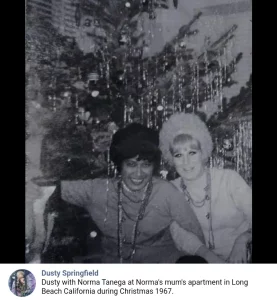
PARADE OF LOVERS
Dusty started churning through women beginning in the mid-sixties. In 1966 Springfield met American singer Norma Tanega, a Mexican-American singer, painter and activist. The couple fought just as hard as they loved. “I can’t tell you how many times I got that phone call at three in the morning,” said one of Dusty’s friends. “Get over here, Cat’s trying to kill me!” (Cat was Norma’s pet name for Dusty). Or, “John, come quick, Norma’s trying to kill me!” Dusty was prone to having flings behind Norma’s back. “I don’t mean that I leap into bed with someone special every night, but my affections are easily swayed and I can be very unfaithful. It’s fun while it’s happening, but it’s not fun afterwards because I’m filled with self-recriminations. The truth is I’m just very easily flattered by people’s attentions, and after a couple of vodkas I’m even more flattered.” She added, “I suppose to say I’m promiscuous is a bit of bravado on my part. I think it’s more thought than action. I’ve been that way ever since I discovered the meaning of the word. I used to go to confession and tell all my impure thoughts.”
Norma Tanega left Dusty in the early 70s when she found their relationship too difficult to sustain. According to Tanega, Dusty “wanted to be straight and she wanted to be a good Catholic, and she wanted to be black.” Springfield owned that while she was brought up Catholic, she no longer went to Mass. “It’s about six years since I made my Easter Duties. My mother’s going to love this. I still think that because I don’t go to Confession I’m going to go to hell but I haven’t done anything evil. I’m just lazy and self-indulgent.”
After Norma, Dusty began a string of on and off relationships, short affairs and one-night stands. From 1972-1978, she saw Faye Harris, an American photojournalist. In the 70s she was linked to the tennis pro Rosie Casals, although Casey’s said they were close friends, not lovers. There was a woman in Australia that shoved Dusty into a hotel fountain during a fight. In 1968, while recording her masterpiece album, “Dusty in Memphis,” she had a torrid affair with a woman named Sandy, drinking and partying so hard that she lost her voice. During the same trip, Dusty got into a fight with Sandy or another woman, which ended up with a TV in the hotel’s swimming pool at 4 am. One of them had picked up the TV and thrown it at the other. It went out the window and down 14 floors into the pool. One woman called the police on Dusty saying she had drugs. “As it happens I know who tipped them off,” she said. “There was a rather hysterical lady who was upset because I didn’t fancy her.”
In 1970 she gave an extremely brave interview to Ray Connolly in London’s Evening Standard, talking about her rumored attraction to women. “There’s one thing that’s always annoyed me, and I’m going to get into something nasty here. But I’ve got to say it because so many people say it to my face. A lot of people say I’m bent, and I’ve heard it so many times that I’ve almost learned to accept it. I don’t go leaping around to all the gay clubs but I can be very flattered. Girls run after me a lot and it doesn’t upset me. It upsets me when people insinuate things that aren’t true. I couldn’t stand to be thought of as a big butch lady. But I know I am perfectly capable of being swayed by a girl as by a boy. More and more people feel that way and I don’t see why I shouldn’t.”
THE OBSCURE YEARS
Dusty Springfield’s honesty came at a price— her popularity waned and she didn’t have a hit single for another 15 years. By the early 70s her stardom was over, and during the next decade and a half she faded into obscurity in LA as her fortune and career ebbed away. In 1972, Dusty had decided to flee the English press and move to California. The move left her short of money and without the support network she had in London. Her alcohol and drug use increased, and she found herself caught in an alcoholic haze that’s still too familiar to lesbians and gays torn between the closet and the need to live honestly. “When I knew Dusty, unfortunately, she was a mess,” said a lesbian business owner in LA who had a brief affair with her. “She was a very fragile, brilliant, special person—the sweetest, nicest person you could ever know. But she was also the most insecure person who ever lived. She was drinking, using, and slitting her wrists. She was so vulnerable.”
In the mid-seventies Dusty plucked up the courage to tell her parents that she was a lesbian—only to have it dismissed as unimportant or a joke. She was devastated by their reaction not to take her seriously. By then, her drug use was out of control, her love life reduced to a string of short-lived affairs, the sales from her recordings were low, and her royalties reduced to a trickle. She was often between stays in rehabs and hospitals. But she had yet to reach her lowest point.
DEMONS, DRUGS AND ALCOHOLISM
In 1974, Springfield’s mother passed away. This brought her to a deep mental low. Her lover, Sue Cameron, said that Springfield would sit on the floor and hallucinate about demons. “She would scream a lot,” Cameron said. “She’s say, “Demons! Demons! They’re coming to get me! – over and over again. “She’d also threaten to harm herself. She said when she cut herself she knew she was alive, because she could feel it.” A succession of psychiatrists confirmed that Dusty was struggling not only with alcoholism but also mental illness; depression and bipolar disorder. She also attempted suicide multiple times. Cameron ended her relationship with Springfield when Dusty chased her with a knife. “I will never know whether she intended to hurt me or not,” Cameron said. “She was laughing at my terror as she came toward me, teasing me by thrusting the knife closer and closer as I backed up. In my heart I think she was playing a sick game that was almost out of her control. I ran out of there to save myself.”
In 1981, Dusty met Carole Pope of Rough Trade, a Toronto-based rock band known for their provocative lyrics. Their 1981 hit, “High School Confidential,” was one of the first explicitly lesbian-themed Top 40 hits in the world.
“She’s a cool blonde scheming bitch, She makes my body twitch. Walking down the corridor. What’s her perfume? Tigress by Faberge. She makes me cream my jeans when she comes my way.”
In 2000, Random House published Pope’s autobiography, Anti Diva. The book detailed Pope’s relationship with Springfield, how they met and first had sex. “My manager, Vicki Wickham, thought that Dusty and I should meet. I heard stories Vicki told about Dusty, and she sounded like a handful, but Vicki believed that you could have any woman you wanted if you put your mind to it. Her mantra, “Every Bird is pullable,” had become part of my philosophy. So, in the fall of 1980 I flew to New York to meet the Queen of the Mods and see her perform at a supper club called the Grand Finale. Vickie came with me. The place was packed with Dusty fanatics and celebs; the audience included Rock Hudson and Helen Reddy, the singer of “I am Woman.”
“My first words were, “Vicki suggested we meet.” Dusty looked at my shyly and smiled. We started to talk and joke around, and within minutes were flirting madly with each other. In the middle of our dance of seduction, Helen Reddy came backstage with her husband. Dusty and I turned to each other and said, after they left, “Why is she married? She seems like a big dyke.”
Some months later, Dusty invited Carol to see her at the Montreal Ritz-Carlton. “I tentatively knocked on the door of Dusty’s suite. She answered, then stepped back into a rococo décor accented with heavy black and gold wallpaper. She seemed shy and unsure, and she was not alone. Her assistant—a girl draped in peals who epitomized the meaning of the word preppy—was introduced as Westchester. She discreetly left the room. Yes, the air was thick with sexual tension. She offered me a drink, and the next thing I knew we were all over each other. We tumbled into bed, half-naked. It was the first time I’d been with an older woman. Dusty had several years on me, and I found the idea very erotic. I fixated on her sensual mouth and unfathomable eyes. The most erotic thing we ever did in bed was this: I would beg Dusty to sing to me. She would put her mouth up to my ear. Then the sound of her voice, so intimate and so close, would wash over me in waves of pure pleasure.
Carol Pope asked Dusty to sing background vocals on a song, “The Sacred and the Profane,” she wrote for Rough Trade’s 1981 album, “For Those Who Think Young.” “Under the influence of Dusty—my twisted Catholic girl—my brain was inundated with images of Fellini films and Catholic morality.”
The hairdresser teaser her coif
With his tail comb
She has the tortured look of a Magnani
Constantly hounded by the paparazzi
The blood of Rome runs through her veins
She’s frightened by her overactive hormones
Mondo Italiano La Dolce Vita
Lust is written all over her face
She loves the smell of danger…
The fury of fallen angels
The aspirations of saints
The sacred and the profane
The relationship between the two started to erode the first time Carol had to take Dusty to the emergency room. “Dusty had taken some pills, coke, and God knows what else.” Carol took the knife out of Dusty’s hands when she started to cut her arms. “I tried to ignore the faded scars on her arms…What kind of self-loathing drove her to it?…Dusty was mainly silent about her past and the origin of her demons.”
“We broke up in LA. I told her I was being torn apart by her behavior. She was lost and I cared deeply about her, but she was fucking up my life. Dusty was very sweet, and resigned to the outcome. A few months before she died, Dusty called Carol to apologize. “She said, “I’m sorry for the way I behaved when we were together. You know I loved you.”
Dusty started to attend Alcoholics Anonymous meetings to help her deal with her drinking. She met actress Teda Bracci at an AA meeting in 1982 and they moved in together in April 1983. Bracci recalled that during a trip to Rome Dusty kissed her on a balcony overlooking the Vatican in defiance of her faith. 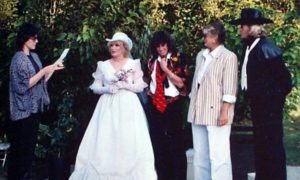
The two women wed at the end of 1983, exchanging vows in a backyard ceremony in LA’s San Fernando Valley. A lanky and vivacious brunette, Bracci appeared in some action films: a biker chick in CC & Company with Joe Namath and Ann Margaret; a prison inmate in a few episodes of Falcon Crest, a popular TV soap opera; a female lead in the LA premiere of Hair; and headlined in famous Sunset Strip rock clubs like The Troubadour and the Whiskey-A-Go-Go. The “best lady” at the wedding ceremony said Dusty wore a formal wedding gown, and the other bride wore a pants outfit with a vest and tie. Dusty was trying to stay sober, so anyone who wanted a drink would need to retrieve a bottle of Jack Daniels that hung from a rope outside the bathroom window. “Everyone seemed happy and peaceful that day,” the best lady said.
But like her other relationships, her marriage to Bracci quickly deteriorated into drunken violence. In one incident, Dusty menaced Bracci with a broken cup and slashed her leg. Bracci responded by hitting Dusty repeatedly in the head with a boot.
The last straw came on a day when Dusty was drinking wine and taking Valium. Teda returned to their apartment and the inevitable fight ensued. Bracci hit Springfield in the mouth with a saucepan and her teeth were knocked out. A plastic surgeon was able to patch her up, but damage to her face was permanent. The couple separated, and by 1987 Dusty headed back to Britain and a revival of her musical career.
BREAST CANCER
Dusty recorded several songs with the Pet Shop Boys, including the hits, “What Have I Done to Deserve This,” (1987) and “Nothing Has Been Proved,” (1988). In 1994, during work on her last album, “A Very Fine Love,” Dusty discovered she had breast cancer. Although her initial treatment was successful, the cancer returned and she died on March 2, 1999, in Henley-on-Thames, Oxfordshire, one month short of her 60th birthday. She had a Catholic funeral Mass in St. Mary the Virgin Church. Her casket was brought to the church by a horse-drawn carriage as she requested, and “You Don’t Have to Say You Love Me” was playing as her casket was carried into the church. Hundreds of fans and people from the music business attended her funeral, including ex-lover, Carol Pope.
In her last interview with the New York Times, Dusty said she would be very happy if her life took her back to Ireland. Her brother Tom, honored her wish and scattered a portion of her ashes near her favorite spot, the Cliffs of Moher. The rest of her ashes are buried under a granite marker in St. Mary the Virgin churchyard in Henley.
In the months before her death, Dusty reflected on her life with two of her friends. Lee Everett-Akin was the widow of gay DJ Kenny Everett. Like Dusty, he was raised Catholic, and that formation stayed with him throughout his life. “Being “outed” was one of her greatest fears. She just felt that she would be rejected by everyone if her secret came out. “We had a great affinity around her sexuality because Kenny felt exactly the same way. He was terrified of people finding out. They were very similar people, in that they were both brought up strict Catholics and that brought with it an awful lot of guilt.” Lee added that one of Dusty’s biggest regrets toward the end of her life was that she never settled down with someone. “She had so much love to give, even though she knew she was impossible to live with. She would say, “My life would’ve been so different if I’d had a good relationship.” Lee Everett-Akin had tried to persuade Dusty to write her life story, but Dusty told her she couldn’t remember most of it because of drugs and drinking. “The saddest thing of all,” Everett-Akin said, “was that when she was dying she told me she was embarrassed by her life, by the drinking, the failed relationships. She felt she had made so many mistakes in her life.”
Lee Everett-Akin’s comments echoed those of another close Dusty friend, Simon Bell, who moved in with her for the last 14 months of her life. “There were certain things she was addicted to, like the drink and the drugs and indeed relationships, that she eventually learned she just couldn’t have, said Bell. “She was never totally comfortable with the fact that she was a lesbian. She was very open privately with me but I think her Catholic background stayed with her right to the end and she never completely came to terms with it.”
MY LANGAN LOVE
The anger and the sadness of being a gay or lesbian Catholic always remains. Allies in local parishes, sympathetic clergy, and the large poll numbers of Catholics who believe their LGBT brethren should be treated fairly and respectfully encourage our belief that we truly belong; but the words we heard growing up and as young adults—that we were sick, our desires were twisted, that God, Jesus and the Church were against us—still resonate in our memories and emotions.
Despite all the negativity and doubt, there are times when we feel at home—with a place, in a song, with ourselves. In a YouTube video search of Dusty singing, I chanced on a clip of her performing “My Lagan Love” during a 1967 TV show. It is an old Irish ballad. “People get the idea,” she starts, “that all Irish songs are either “Paddy McGinty’s Goat” or “When Irish Eyes are Smiling,” all those lovely sorts of Hollywood Irish songs. Actually, the most beautiful ones I’ve ever heard are played by a very old gentleman somewhere in Donegal…The song that impressed me most of all was the one I’m going to attempt to sing for you now, called My Lagan Love.” A harper accompanied Dusty, who played an acoustic guitar. 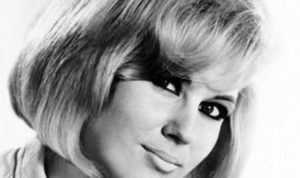
My Lagan Love
Where Lagan streams sing lullabies
There blows a lily fair.
The twilight gleam is in her eye,
The night is on her hair.
And like a lovesick Lennan-shee
She hath my heart in thrall.
No life have I, no liberty,
For Love is Lord of all.
And often when the beetles horn
Has lulled the eve to sleep
I’ll steal into her shelling lorn
And through the doorway creep.
There on the cricket’s singing stone,
She makes the boxwood fire
And sings in sweet and undertone
The song of hearts desire.
Her welcome, like her love for me,
Is from her heart within.
Her warm kiss is felicity
That knows no taint of sin.
And when I stir my foot to go,
‘It’s leaving Love and light,
To feel the wind of longing blow
From out the dark of night.
Dusty’s performance was shy and humble, which made her rendition of the song even more piercingly beautiful. The verses of anticipation, desire, love and longing were authentic; not the covert references to love in her Top 40 hits. Dusty was fully at home and in peace in the love song, and it was beautiful to hear, see and experience.

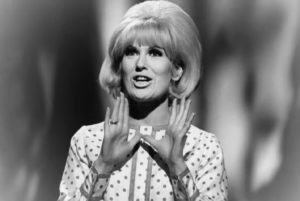

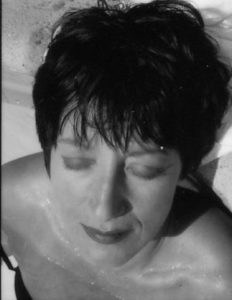
April 30th, 2023 at 2:23 am
Hi, Karen! Wonderful piece on Dusty. . . . I recently remembered and celebrated her on the 84th anniversary of her birth. You can check-out my blog post here.
April 30th, 2023 at 3:49 am
Hi Michael, thank you for stopping by and your kind words on my Dusty Springfield post. You’ll be pleased to know I wrote it during our recent trip to Sydney, Australia (!), to visit our son and his family who are living there now. With the time difference, I’d be up VERY early, so this gave me plenty of time to write. I’m glad in your comment you included the link to your recent post on Dusty Springfield. She was a talented singer with a lot of love to give. I wish she was less tortured. Sadly, that was life back then for most lesbians and gay men; and still that way for many today. Take care. Big hugs. Karen
January 6th, 2024 at 10:16 pm
What a lovely article. The most comprehensive I have read about her love life. Thank you for keeping dusty alive 🙂 ??